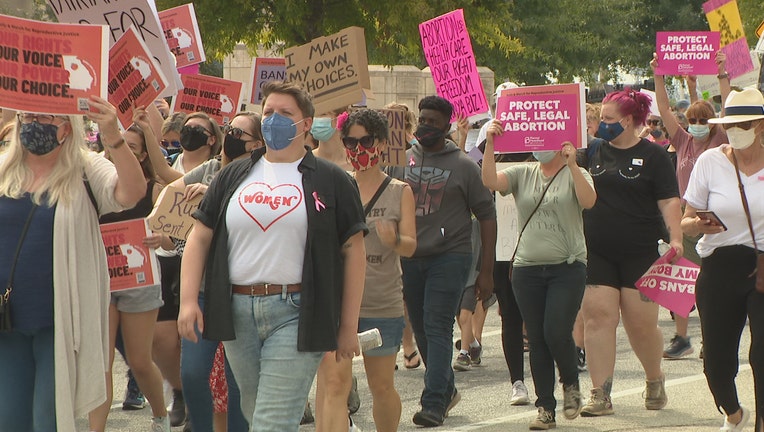Activists march for reproductive rights in Atlanta

Protesters in Atlanta march for reproductive justice.
ATLANTA - Activists across the U.S. are gathering for a protest of abortion bans, including one in Georgia.
The "March for Reproductive Justice," began at 11 a.m. at Liberty Plaza in Atlanta, where speakers took to a podium before activists took to the streets.
Activists shared personal experiences and told stories advocating for abortion rights.
"One in four people who can get pregnant in this country will have an abortion — an abortion is normal," Staci Fox, CEO and President of Planned Parenthood Southeast said.
Just outside the Gold Dome, activists advocated for people in support of progressive policies to turnout for local elections.
"Reproductive justice work is healthcare work," Kimberlyn Carter, President of Represent Georgia said.

Georgians march for reproductive justice
The protest of abortion bans begins at Liberty Plaza in Atlanta, but the movement is a national one, sparked by a new Texas law. A federal appeals court heard arguments over Georgia's own 'Heartbeat Bill." The court delayed that decision last week while it waits for a U.S. Supreme Court ruling on a Mississippi law.
Recent legislation in Texas sparked the synchronized movement across the U.S., but Georgia's own abortion law was in the spotlight a few weeks ago.
A federal appeals court said it will wait to weigh in on Georgia's so-called "Heartbeat Bill" until the U.S. Supreme Court rules on another case that seeks to overturn a woman’s right to an abortion. Mississippi has argued in court filings that the U.S. Supreme Court should overturn its decision in Roe v. Wade. The high court is set to hear arguments in that case in December. Mississippi’s law would ban abortions later than 15 weeks into a pregnancy.
A federal judge blocked Georgia’s 2019 "heartbeat" abortion law in 2019, finding that it violates the U.S. Constitution. That decision was appealed but the law remains blocked, and abortion in Georgia remains available up to 20 weeks into pregnancy.
Cardiac activity can be detected by ultrasound in cells within an embryo that will eventually become the heart as early as six weeks into a pregnancy before many women realize they’re pregnant.
The law included exceptions for rape and incest as long as a police report is filed. It also provided for later abortions when the mother’s life is at risk or a serious medical condition renders a fetus unviable. The law also would have granted personhood to a fetus, giving it the same legal rights as people have after birth.
The 1973 decision of Roe v. Wade declared a fundamental right to an abortion prior to the viability of the fetus. Planned Parenthood v. Casey narrowed that in 1992 to say states can’t place an undue burden in the way of women seeking an abortion prior to viability.
Georgia’s so-called heartbeat law was one of a wave of laws passed by Republican-controlled legislatures in recent years to attack those rulings in a conservative Supreme Court majority.
WATCH: FOX 5 NEWS LIVE COVERAGE
_____
GET BREAKING NEWS EMAIL ALERTS FROM FOX 5
DOWNLOAD THE FOX 5 ATLANTA APP FOR BREAKING NEWS AND WEATHER ALERTS

